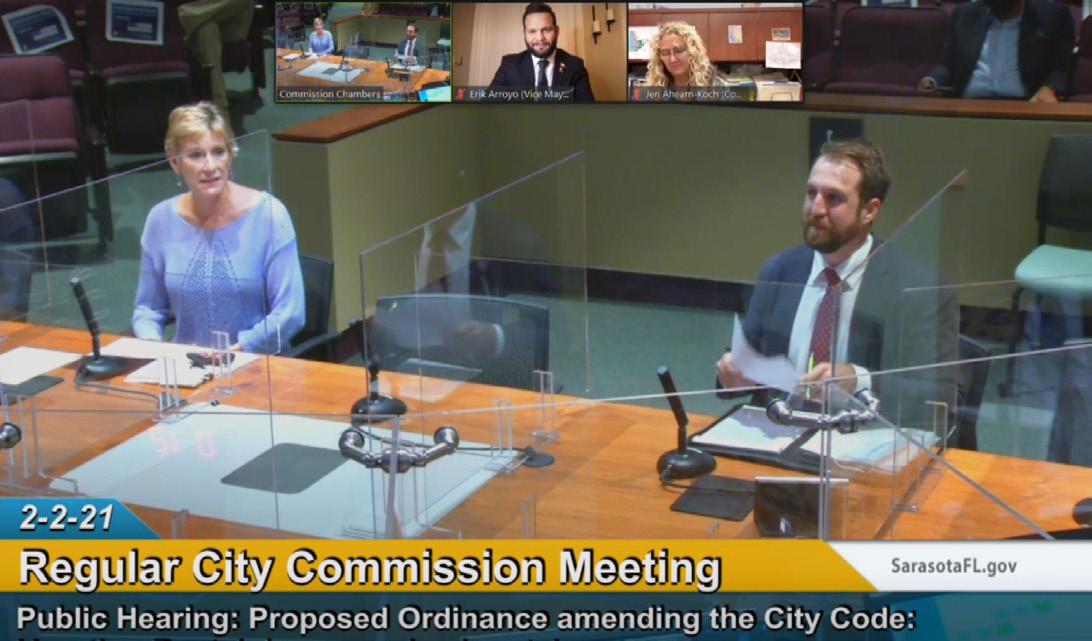
3 minute read
Government Affairs
City of Sarasota Discusses Regulating Vacation Rentals Again
By: Max Brandow, RASM Government Affairs Director
On Tuesday, February 2, the City of Sarasota Commissioners heard a proposed plan to potentially regulate vacation rentals in the city. The plan proposed a handful of new registration requirements; duties for property owners to take on code enforcement tasks on their own, various requirements for upkeep of the property (some of which aren’t even required by hotels), as well as a cap on occupancy.
RASM voiced concerns on the impact a burdensome regulatory scheme, such as the one proposed, would have on property owners as well as the overall economy in general. The direct impact for Sarasota County due to vacation rentals is approximately $112 million annually. By a 3-2 vote, RASM and other private property rights advocates were able to get the discussion continued without a formal vote on the proposed ordinance. The next step will be a continuation of first reading around March or April. RASM and the Government Affairs Department will let you all know when the next hearing is in case you would like to voice your concerns to the City Commission.
FEDERAL EVICTION MORATORIUM
As expected, this past month, the CDC extended the eviction moratorium through March 31. NAR continues to advocate for an end to the moratorium and additional rental assistance for housing providers in its latest coalition letter that was sent to congressional leaders on Wednesday.
Moving down to the state level, Florida has received $1.43 billion for the rental assistance program that was funded in the last federal relief package. As the state works to finalize how those funds will be dispersed, we remain in daily contact with the Executive Office of the Governor to reinforce the urgent need to launch the program.
If this issue impacts you or your clients, I highly encourage you to review NAR’s comprehensive FAQ on the rental assistance program (narfocus.com/ billdatabase/clientfiles/172/26/4033.pdf). You can also join their Property Management Forum page on Facebook group for the latest information.
DOES AFFORDABLE HOUSING LOWER NEARBY HOME VALUES? ECONOMISTS SAY NO
A study conducted by Redfin Economists looked at over 200K sales in 26 metro areas over the past decade and found no difference in price after affordable housing was built in 18 metro areas. In four areas prices rose, and in four metro areas prices decreased.
In 69 percent of the metro areas studied (18 of the 26), economists detected no significant difference in nearby home prices sold before and after the construction of a low-income housing development compared with similar homes farther from the development but within the same neighborhood. In four of the eight metro areas where significant differences were detected: Boston, Philadelphia, Washington, D.C., and Charlotte, NC, homes near low-income housing developments sold for more after the development was constructed. However, in the remaining four metro areas: Chicago, Las Vegas, Phoenix and Warren, Michigan, homes sold for less after low-income housing developments were built nearby.
“For children in low-income families, living in a neighborhood with less poverty can have a big impact on mental and physical health as well as long-term earnings throughout their life,” says Redfin senior economist Sheharyar Bokhari. “But economically integrated neighborhoods – those with low-income housing near homes for middle- and high-income households – are so rare because development of lowincome housing often faces strong opposition from some neighbors. These perceptions have made socioeconomic segregation even more pervasive throughout the United States, further exacerbating social, racial and housing inequalities.”
The study can be found online at www.redfin.com/ news/low-income-developments-home-values/ and includes three Florida metro areas in the data – Miami, Orlando, and Tampa. •









